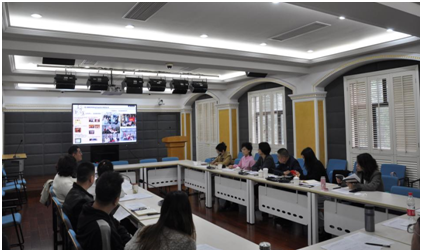On the morning of 8 April, Zhou Yin'e, the Deputy Party Secretary and Secretary of the Discipline Inspection Commission of the Shanghai Theatre Academy, and Zhang Weiling, the Deputy Party Secretary and Vice President, visited the College of Chinese Opera to conduct a special employment and entrepreneurship research. The meeting was attended by the Department of Student Affairs, the Comprehensive Office of Discipline Inspection and Supervision, the leadership team of the College of Traditional Opera, heads of various majors, homeroom teachers of the graduating classes, and counselors.
The meeting was chaired by Qi Jisong, the Deputy Secretary of the Party General Branch of the College of Chinese Opera. He gave a detailed introduction on various aspects such as the college's recent employment data, challenges and problems in employment work, breakthroughs and reflections in employment and entrepreneurship, the effectiveness of certain measures in employment and entrepreneurship, and opportunities for the next steps in advancing employment and entrepreneurship. In recent years, the College of Chinese Opera has achieved significant results in employment and entrepreneurship work, which has also laid a solid foundation for future employment and entrepreneurship efforts. On the one hand, this success is inseparable from the support and concern of the university leaders, and on the other hand, it is the result of the concerted and collaborative efforts of the Party and administrative teams of the College of Chinese Opera.

Counselors Xia Yishi and Zhang Yu reported on the employment progress of the 2024 graduates of the College of Chinese Opera. Heads of various majors and homeroom teachers of the graduating classes, in the context of the characteristics of their respective specialties, focused on discussing measures to ensure employment outcomes, existing problems, and guidance on students' career choice attitudes.

The meeting emphasized the commitment to ensuring the employment outcomes of this year's graduates. Members of the leadership team of the College of Chinese Opera spoke in turn, indicating that in recent years, the Party and administrative leaders of the College of Traditional Opera have paid close attention to the work of employment and entrepreneurship, and the college as a whole has worked together from top to bottom to promote the long-term mechanism and high-quality development of employment and entrepreneurship. Deep consideration was given to the characteristics of students in different majors, talent cultivation methods, curriculum settings, and the enrollment patterns of majors in Chinese opera, aiming to cultivate outstanding talents with professional expertise, early career choices, wide-ranging employment opportunities, and strong entrepreneurial capabilities.
Zhang Guoli, the Deputy Director of the Department of Student Affairs, suggested that guidance for student differentiation can be introduced in advance based on the characteristics of the majors and the particularities of the industry, and a joint effort can be formed at the level of subordinate colleges and departments and functional offices to further enhance students' capabilities in innovation and entrepreneurship. Li Dongmei, the Director of the Department of Student Affairs, provided constructive suggestions for the employment and entrepreneurship work of the College of Chinese Opera, such as establishing a Chinese Opera Career Life Studio for early planning, categorized guidance, new ideas, breaking barriers, building platforms, and establishing models.

Deputy Secretary Zhang Weiling pointed out that employment and entrepreneurship work is an important test in the students' entire training process and a significant means of comprehensive education, which should consider education both within and beyond the realm of Chinese opera. He made requests from several aspects such as how secondary colleges can form a joint force, the establishment and improvement of the employment and entrepreneurship work mechanism, guidance on career choice attitudes, and the “one student, one strategy” measure for solid and effective implementation, like coordinating the recruitment and employment services for students at college and vocational school levels, preparing for the establishment of a Chinese Opera Career Life Studio, encouraging students' diverse development, establishing a reward system for employment and entrepreneurship at the level of subordinate colleges and departments, establishing a follow-up survey mechanism for graduates, and assessing the effectiveness of teaching practice bases from the perspective of employment. All these provided a clearer direction for the high-quality employment of graduates from the College of Chinese Opera.

Deputy Secretary Zhou Yin'e stated that employment and entrepreneurship are among the focal points of our university's annual political supervision work, and that we should consider issues from a higher and more far-reaching perspective. She suggested that subordinate colleges and departments should reaffirm their responsibilities, creating a synergistic effort of colleges and departments in educating people through an all-staff, all-rounded, and whole-process approach; according to the characteristics and current status of the Chinese opera specializations, the College of Chinese Opera should further optimize the talent development plans and establish a personalized career education system with categorized guidance. She emphasized the importance of handling employment procedures and the requirement to effectively implement the "one student, one strategy" approach.
Finally, Deputy Secretary Zhang Weiling made detailed arrangements for this year's employment and entrepreneurship work at the College of Chinese Opera. After the meeting, the College of Chinese Opera will, in accordance with the requirements set at the meeting, vigorously promote high-quality and fuller employment of graduates, while refining the work methods and conducting thorough reviews and reflections.



